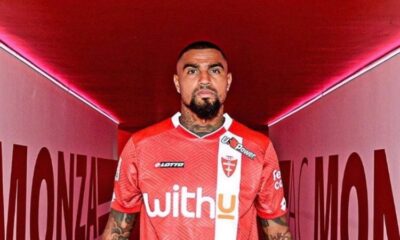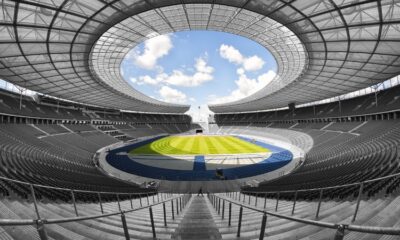Bundesliga
Hertha wanted to compete with Bayern, but they are not even close to fulfilling their ambitions. Why didn’t it work out and what are the chances for a brighter tomorrow?
Hertha Berlin is having a tragic season, struggling to stay among the elite. Not so long ago, it declared that it wanted to become a German big club in order to compete with Bayern for the title. It even brought in some pretty expensive reinforcements. Why has the Berlin club never come anywhere near its ambitions?

Hertha Berlin is having a tragic season, struggling to stay among the elite. Not so long ago, it declared that it wanted to become a German big club in order to compete with Bayern for the title. It even brought in some pretty expensive reinforcements. Why has the Berlin club never come anywhere near its ambitions?
It was June 2019, it was supposed to be a historic moment. Hertha Berlin had fallen under the ownership of German businessman Lars Windhorst and his investment firm Tennor Holding B.V. It was the biggest financial deal in Bundesliga history.
The motivation was clear. The new owner of the Berlin club claimed that he wanted to make Hertha a club worthy of Berlin, the German capital. In fact, compared to other European leagues, it was only in the German top flight that there had been no stable and competitive team from the capital in the league for a long time. Hertha last won the title in 1931, it is the oldest club in Germany.
The goal was therefore to compete with Bayern and make Hertha one of the best clubs not only in Germany but also in the whole of Europe. Almost three years have passed and not only is the hope gone, but there has not been much optimism in the club for some time.
Hertha’s plans were big
Just days after the sale of the club was completed, long-time coach and club legend Pál Dardai was dismissed. Hertha was trying to get a big name as coach. However, Erik Ten Hag or André Villas-Boas turned down the offer.
Dardai was therefore replaced by Ante Covic, who had a long and very successful career with the reserve team. This was a progressive and promising coach. And that he had the weakest squad at his disposal? You can’t say that. He may not have had a team that could fight for cups, but he certainly shouldn’t have been fighting for retention either. But it was happening.
The Klinsmann comedy
As already mentioned, Covic did not do very well as a coach. So, in November 2019, he was replaced when Hertha were in relegation waters. The replacement? The legendary Jürgen Klinsmann. He started to make big demands, he had ambitions to fulfil, he had the experience to do it. The winter transfer window looked like that.
In January, Hertha brought in Krzysztof Piatek, Matheus Cunha and Lucas Tousart. However, Tousart did not join the team until the new season. But he arrived from the famous Lyon, it was a clear signal.
After all, the French midfielder himself claimed that Hertha can undoubtedly be the German PSG and be absolutely dominant in their league. He himself probably had no idea how wrong he would be. Although Klinsmann brought him into the team, he didn’t even play under him.
Klinsmann, in fact, had only coached the team for ten games. Three wins, three draws. He got Hertha out of the relegation zone. But then he resigned. And he announced it on social media. The reason? He didn’t feel enough support and cohesion, he said the club was doing little to stay up. So by February 2020, it was all over.
What’s the problem?
Since June 2019, when Hertha announced big ambitions, four coaches have been on the coaching bench until December 2021. After Covic and Klinsmann, Bruno Labbadia came in to put out the fire and was replaced by the returning Pál Dardai in January 2021.
None of the four coaches could fulfil the ambition. Or even come close. So it was up to sporting director Michael Preetz, who retired in January 2021, to put his head on the chopping block after 12 long years in the job.
According to several experts, it is Preetz who is the reason why Hertha has suffered so noticeably. He may boast that he was responsible for the Berlin outfit’s record spending in the January transfer window across Germany, but it hasn’t led to anything.
Between 2009 and 2021, Preetz fired 11 coaches, spending over €200m on top of that, but that is nowhere to be seen. All in all, no reinforcements have caught on. At least in the last time Hertha spent the most ever in its history.
The 4 most expensive transfers in the club’s history took place in the first season after the arrival of a rich investor, not a single player became an important part of the team, let alone leading the team to success.
Preetz has virtually failed to identify any suitable philosophy. He didn’t bet on either young talent or ready-made players. He hasn’t done well in his coaching choices either. He just got the money and didn’t know what to do with it. The club was in absolute chaos and decline.
Will a change of sporting director help?
Preetz hasn’t been at the club since January 2021 and has been replaced by Fredi Bobic, who did a fantastic job between 2016 and 2021 at Eintracht Frankfurt, who not only played really attractive football but also attracted interesting players, sold well and were competitive.
For just under a ridiculous €42 million, Bobic brought players like André Silva, Luka Jovic, Ante Rebic and Sébastian Haller to Frankfurt. A little later, he made 100 million on this trio. In addition, Frankfurt also broke into Europe, making more money.
Bobic started selling unnecessary players immediately after his arrival at Hertha and instead did his best to give youth and talent a chance. But he didn’t and doesn’t have any free hands. In the summer, for example, he couldn’t fire coach Dardai even though he wanted to. He could hardly then make any noticeable changes to strategy and processes within the club. All Dardai needed to do to keep his position was not to resign, which he did.
Yet he lost the position in November 2021. Even the people above Bobic could not overlook the fact that there was no path to success with Dardai. But by November, Bobic hadn’t accomplished much in his search for a coach. So at least he brought in relegation specialist Tayfun Korkut.
Bobic is in office or It’s too early to mock, now it can only begin. BUT…
At the moment, the goal is clear. Hertha have a lot to do to hold on. They are currently in 17th position, which means direct relegation. But they will definitely still want to fight for the non-relegation places. But if the rescue is successful, only a bright future can await Hertha.
Bobic is starting to take office and it is likely that Korkut will not remain on the bench after the season. He could be replaced by Niko Kovac or Roger Schmidt, whose contract at PSV Eindhoven expires in the summer.
Why Kovač? Berlin is his hometown, he has played over 200 games for Hertha and has already had a successful stint at Frankfurt under Bobic. Together they could ensure a bright future for Hertha.
Bobic has also reformed virtually the entire scouting department, bringing in two scouts from Frankfurt, another from Arsenal. A wider talent scouting network is being built.
But everything has its “buts”. In this case, the aforementioned keeping the Aces among the elite is crucial. Windhorst’s owner is unhappy with the lack of decision-making power and the results. He doesn’t want to pump more money into the team without knowing it makes sense.
Bobic could be the guy. But he has to earn trust, and not just with the results. If anyone has the skills to fulfil Hertha’s ambitions, it’s him.
Sources: Hertha BSC, Bulinews, Bild, Transfermarkt






